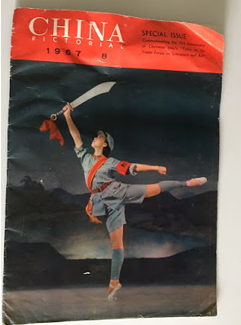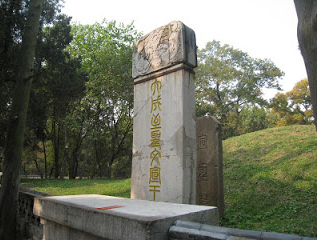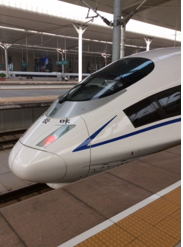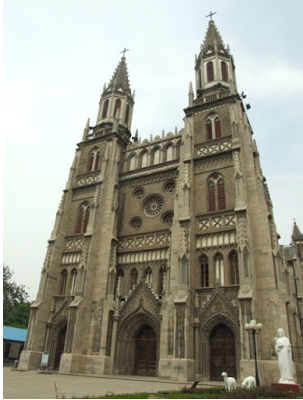My lovely Chinese friends – by GEORGE BRAINE
In the late 1960s, Peoples’ Publishing House, in Slave Island, advertised a list of Chinese periodicals at bargain prices, and I dropped in and bought a subscription to China Pictorial, a large, colorful, monthly magazine. The annual subscription was only Rs. 10, and even I could afford that!
 In those days of black-and-white newspapers and magazines, when most news stories came from the West, China Pictorial was a welcome change. Filled with colorful, large photos of dancing troupes, farmers in their fields and fish ponds, young “pioneers” in red scarves, soldiers and ballet dancers in heroic poses, steam powered trains and their drivers, and – the main attraction for me – young, smiling, Chinese women, all in pigtails. It was pure propaganda, of course, but I had no inkling how this knowledge would come in handy 40 years later.
In those days of black-and-white newspapers and magazines, when most news stories came from the West, China Pictorial was a welcome change. Filled with colorful, large photos of dancing troupes, farmers in their fields and fish ponds, young “pioneers” in red scarves, soldiers and ballet dancers in heroic poses, steam powered trains and their drivers, and – the main attraction for me – young, smiling, Chinese women, all in pigtails. It was pure propaganda, of course, but I had no inkling how this knowledge would come in handy 40 years later.
Shumin
The first Mainland Chinese person I met was Shumin, in 1984, when I was a graduate student at a US university. When she joined our program, she became a star attraction being the very first student from the Peoples Republic on campus. Her vivacious personality and natural curiosity about anything American also drew people to her.
I recall taking her on a tour of the neighborhood supermarket and seeing her startled expression as we strolled through the pet food aisle. Seeing all the pictures of cats and dogs on the can labels, she asked me “Do Americans eat cats and dogs?” Pet food was unknown in China. She was amazed by all the red meat displayed, and said they could only buy the fatty cuts of pork in China, the red meat going to communist party cadres.
We became friends, and she opened up about the hardships of life back home. Hers had been a well to do family, but her father was labeled a counter-revolutionary and imprisoned after the Communist takeover. His crime: during World War II, he had worked for a foreign outfit, never mind that the outfit had fought the Japanese in defense of China! The family became poverty stricken, and Shumin was ordered to the countryside to work in a farm. Her task was to carry excrement to the fields, to be used as fertilizer, on two baskets slung on a pole balanced on one shoulder. (Not quite the propaganda I read in China Pictorial.) Shumin overcame these hardships, became an English teacher, and managed to come to the States. That alone is an incredible story.
Hong Kong
In 1995, I came to Hong Kong to teach at a university. The local population was 99% Chinese, but they were Hong Kongers, distinct in their dialect, Cantonese, and mostly Western in their thinking and lifestyle. The British handed back Hong Kong to China two years later, and the first students from China enrolled at the university a couple of years later.
The Mainland Chinese students entering the English department were older, and a few were full professors at their universities, but lacked doctorates. From being respected professors, they became students overnight on coming to Hong Kong. A few found the transition difficult. One, John, assumed the doctorate would automatically be his because he had authored an “important” book in China. He went about grumpily for weeks after he was firmly told to take courses, conduct research, and write up a thesis under supervision.
These students spoke Mandarin, not mutually intelligible with the Cantonese dialect spoken in Hong Kong. Hong Kongers generally regarded Mainlanders as poor, backward, wicked communists. In return for the stipend they received, these students had to work as research assistants (RAs) and teaching assistants (TAs) to professors. Some undergraduates complained about the incomprehensible accents of the Mainland TAs, although I didn’t have a problem with their pronunciation.
Life was hard for these Mainlanders. Adjusting to life in Hong Kong – with its capitalism, personal freedom, high cost of living, and general use of English, and the prejudice they faced – was a daily challenge. The stipend, although more than double what they earned on the Mainland, didn’t go far in expensive Hong Kong. They lived under tremendous pressure, given only 3 years to complete their research, write-up the theses, and complete the doctorates while also working as RAs and TAs.
In the English department, all the other professors were local Hong Kongers or expatriate Westerners. I was the exception, and when they realized how much I knew about China (China Pictorial and Shumin’s life story coming in handy here), they were amazed. I also regaled them with accounts of Ceylon’s recognition of the Peoples Republic way back in 1950, despite strong objections from the USA, the Rubber-Rice pact between the two countries, and of their beloved Premier Zhou En Lai’s triumphant visit to Ceylon in 1957, when he addressed a vast audience in pouring rain, and, taking off his jacket, climbed all the way to the top of Sigiriya.
I could relate to them because I, too, had struggled as an older graduate student, surviving on stipends. So, I developed an empathy for John, Selena, Sandra, Emily, Sheila, Lillian, and Susan. (They had taken on English first names.) Some walked into my office seeking advice on academic matters, on coping and surviving in this milieu, and occasionally to pour their hearts out. They missed their families, especially the children. Knowing they rarely had a decent meal because of rudimentary facilities at student hostels, I took them for lunch at the Senior Common Room occasionally.
At lunch, I brought up topics such as the Great Leap Forward, and the devastating famine that followed, the Tiananmen incident, how they reacted to Hong Kong’s return to China, and their views on current leaders. Although I probed, they were not very responsive, perhaps not trusting each other enough to speak their minds. Once, when I mentioned the Sino-Indian conflict, John was surprised, asking “Did China and India have a war?” They had never been told about it. I was scathing in my criticism of Mao, and all the deaths he had caused. Later, I came to know that all except one student were members of the Chinese Communist Party!
I remember two incidents vividly. One day, John came into my office, closed the door behind him, and, in a conspiratorial whisper, asked me where he could attend Catholic mass; he was a secret Catholic, a persecuted group in China. I told him that the campus had a Catholic chapel. Another time, at lunch, we were talking about the brutal Cultural Revolution, and I asked Selena how it had affected her. Without batting an eye, she said “My parents committed suicide”. The rest of the meal passed in stunned silence. I learned later that her parents, both teachers, had been publicly humiliated and tortured by Red Guards, who happened to be their own students. Selena’s parents couldn’t bear it any longer.
With doctoral students, one goes beyond teaching and thesis supervision. So I co-authored journal articles with them, and took two to academic conferences abroad, to make joint presentations. I published another in a journal I edited, and listed my favorite student as the second author of a text book I wrote. All this was to give them a head start, so that when they returned to Mainland China, they would have enhanced recognition as academics and the self-confidence that followed.
Then, they began to invite me to China.
In the Mainland
Although I had lived in Hong Kong for more than 5 years, and traveled widely for academic purposes and tourism, I had not crossed the border into the Mainland. For one thing, not many people in China spoke English, and I didn’t speak Mandarin. Also, China’s toilets had a terrible reputation.
Nevertheless, I was curious about what lay beyond the “bamboo curtain”, the China I had read and heard about so much. Surprised that I had never visited China, one student invited me and said she would come along as the guide, and my wife and I took the plunge. First to Beijing, where we walked on the Great Wall, toured the Forbidden City, Tiananmen Square, the Summer Palace, the Hutong courtyards, and other well-trodden tourist sites, visited a nearby cherry orchard, and met with other students who was visiting from Hong Kong. Then, we took our first train ride in China, to Jinan in Shandong province. We traveled on a crowded, old fashioned train, where an attendant went around serving hot tea from a flask. Along the way, I caught a good view of the legendary Huang Ho, the Yellow River, which I had read about in school textbooks.
During this trip, something remarkable happened. I was now their guest, and a hidden feature of their personalities began to emerge. These students were steeped in Confucianism, with its emphasis on filial piety and deep respect for elders and teachers. (I qualified for the latter two!) They smothered us with affection, “shadowing” us from the moment we emerged from our hotel room in the morning, guiding us through the Chinese menus during meals, helping us to get on and off from vehicles, shielding us from touts, and sitting close-by during travels so that they could answer our numerous questions. They were loving to my wife, not letting go of her hand, knowing that she had recently come through a serious illness. Never have we been pampered so much.
 In Shandong Province, we visited Quifu, the birthplace of Confucius, and were taken up Taishan mountain by cable car. After 10 days, when we left for Hong Kong, we were loaded down with gifts.
In Shandong Province, we visited Quifu, the birthplace of Confucius, and were taken up Taishan mountain by cable car. After 10 days, when we left for Hong Kong, we were loaded down with gifts.
China now had an open economy, prosperity was rising, but its effects were not yet felt at universities. The teachers’ salaries were still low, and they had to take on time-consuming additional work to make ends meet. They lived in rather old apartments provided by the universities, and some still rode bicycles to work. The libraries, perhaps due to censorship, had pitifully few books in English.
As more students returned from Hong Kong to their universities, with brand new Ph.Ds. in hand, I began to be invited to speak at academic conferences on the Mainland. I gave keynote speeches in Beijing, Shanghai, Jinan, Wuhan, and Shantou, and also conducted workshops. When I landed at the airport, a smiling former student, now a friend, would be there to greet me, and taken to a hotel in a grand official car. Usually, one or more graduate students would be asked to “shadow” me, spending almost every waking hour with me during the visit.
During these trips, I was taken to nearby tourist sites. I had already seen Beijing and Qiufu, but recall being driven along the beautiful Red Lake in Wuhan to visit Mao’s summer residence, floating down the Li River on a bamboo raft amidst the soaring karst hills, a memorable stay in Yunnan’s magical Lijiang town, and boating on the Yangtze River in Shanghai. Numerous trips to museums and scenic sites were added on.
Many authors are banned in China. One is the Chinese-American Ha Jin, whose best-selling novels include Waiting and War Trash. So, when I travelled to China, I would take a few paperback copies of these books and distribute them to the literature professors, to their delight. My bags were never searched at Customs.
On my repeat visits over the years, I began to notice the rising prosperity of my friends. John had received a huge “joining fee” when he moved to another university, and showed me the beautiful apartment he had bought with that money. Other friends were buying expensive cars, more apartments as investments, and sending off their children overseas to the US and Europe for higher studies. Restrictions on traveling abroad were being eased, and some were spending up to a year at US universities on exchange programs.
 My last trip to China was five years ago. I started at Hangzhou, at a huge English teachers’ conference, presenting a keynote and promoting a textbook I had coauthored with two Mainland friends. For the first time, I would be taking China’s new high speed trains to Jinan and onto Beijing. These trains, sleek and comfortable, reached speeds up to 350 km per hour, and were as good as the bullet trains in Japan. At my next stop, my favorite student, now a top official at her university, was at the station to meet me. The next day, I addressed a large audience in a packed auditorium, and left for Beijing the following morning, to be greeted by another friend. Another talk to a standing room only audience followed. Such audiences are gratifying because I was retired and no longer active in academia.
My last trip to China was five years ago. I started at Hangzhou, at a huge English teachers’ conference, presenting a keynote and promoting a textbook I had coauthored with two Mainland friends. For the first time, I would be taking China’s new high speed trains to Jinan and onto Beijing. These trains, sleek and comfortable, reached speeds up to 350 km per hour, and were as good as the bullet trains in Japan. At my next stop, my favorite student, now a top official at her university, was at the station to meet me. The next day, I addressed a large audience in a packed auditorium, and left for Beijing the following morning, to be greeted by another friend. Another talk to a standing room only audience followed. Such audiences are gratifying because I was retired and no longer active in academia.
On the flight back to HK, I thought about my visits to China over the past 20 years. I had seen the country change beyond belief. Streets that were crowded with bicycles were now jammed with cars. The baggy, ubiquitously blue Mao-style clothes of the masses had been replaced by fashionable clothes rivaling those of Hong Kong. Passports, issued only to trusted Party faithful, were now available to almost everyone. Millions were traveling abroad. Chinese parents would spend up to half a million dollars to enroll a son or daughter at a top American university.
 But, what I treasured were the more personal memories. Riding a bicycle around the lovely Tsinghua campus in Beijing, with my wife seated on the crossbar; walking around in Jinan, and suddenly coming across a Gothic-style Catholic cathedral, built over a century ago; being shown around the beautifully landscaped cemetery in Qiufu, where Confucius and his descendants are buried; taking a three-day hike along the lonely Tiger Leaping Gorge; seeing Mao’s vast bed at his carefully preserved summer retreat in Wuhan, with its huge pile of books; and watching the upper Yangtze river in Yunnan, its swirling waters rushing past.
But, what I treasured were the more personal memories. Riding a bicycle around the lovely Tsinghua campus in Beijing, with my wife seated on the crossbar; walking around in Jinan, and suddenly coming across a Gothic-style Catholic cathedral, built over a century ago; being shown around the beautifully landscaped cemetery in Qiufu, where Confucius and his descendants are buried; taking a three-day hike along the lonely Tiger Leaping Gorge; seeing Mao’s vast bed at his carefully preserved summer retreat in Wuhan, with its huge pile of books; and watching the upper Yangtze river in Yunnan, its swirling waters rushing past.
GEORGE BRAINE







